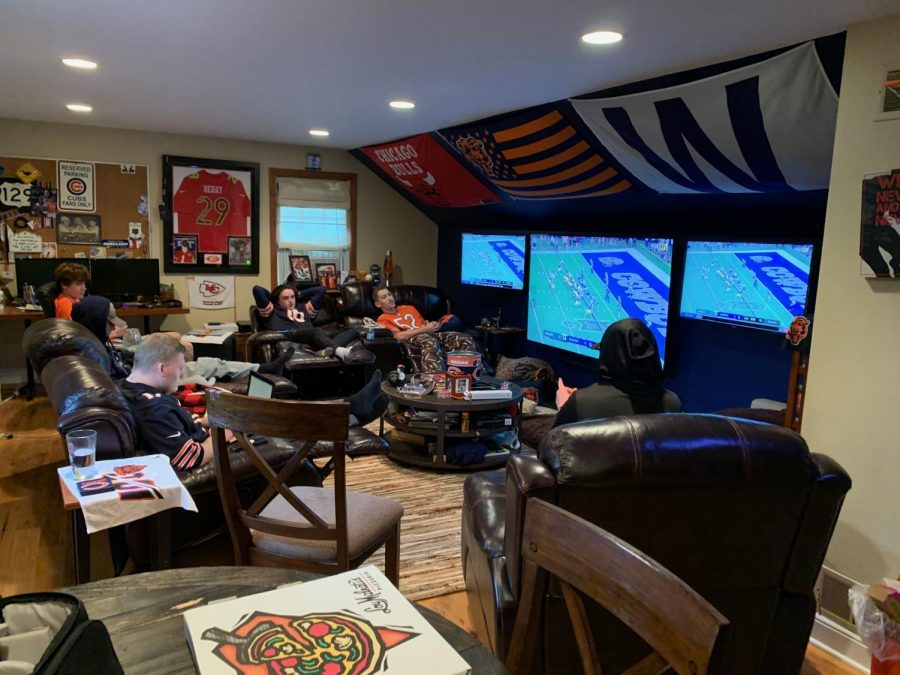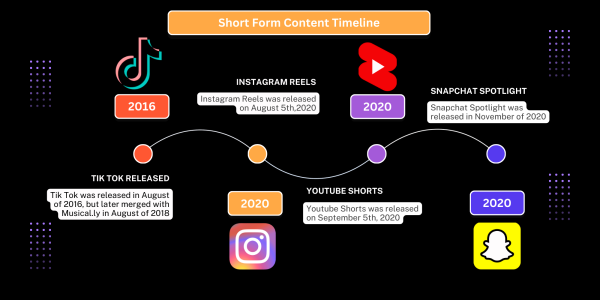Fantasy in Reality: Inside the Daily Workings of Fantasy Football
Senior Jarod Rosenbloom’s fantasy football league gathers around to watch the games and track their players. The focal point of their room consists of three TVs: one in the center to play their main game and the other surrounding two to watch NFL Red Zone.
Crowding around the television screen, football fans sit alert at the edges of their seats. Pizza boxes are strewn haphazardly around the room. All other work at the moment is secondary. The task at hand—watching the game—is all that matters. Cheering with excitement one second and groaning with frustration the next, the fans are taken on an emotional rollercoaster as the game clock winds down. From the first game in September to the end of the regular season in December, Thursdays, Sundays and Mondays revolve around the National Football League (NFL). For fantasy football team owners, this is also true for every day in between.
Playing the game
According to the Fantasy Sports and Gaming Association (FSGA), nearly 60 million people (as of 2017) participated in some type of fantasy sports. Of them, a majority played fantasy football, a game that allows football fans to construct their ideal teams and compete against others, often for money. Each week, teams are matched up against one another within a league and are awarded points based on their players’ performance. At the end of the season, a playoff system is used to determine a winner.
This multi-billion dollar industry sources its revenue from a combination of entry fees, which can range from nothing to hundreds of dollars, and advertisement sales. Although fantasy sports are not considered gambling under federal law, its regulation is left to the discretion of states. Illinois is one of the states that allows fantasy sports, and a gambling expansion bill legalizing statewide sports betting was passed earlier this year. The legality of minors winning and losing money through fantasy play is not well-defined. Regardless, for the 34 percent of American teenagers who choose to participate in fantasy football as reported by the FSGA, putting money at stake is far from uncommon.
“If you’re not playing for money, you’re not going to be as focused and you’re not going to try as hard and pay attention as much as if you have a lot of money on the line,” senior Dylan Drumke stated.
Talking smack
Although money on the line adds a level of incentive to game play, bragging
rights are another reason for the intensity of the competition. Light-hearted teasing is a major component for several players.
“The trophy you win and the smack talk” are both sources of motivation for Drumke. “Just holding over everybody else’s head that you’re the champion. It’s a great feeling,” he mused.
However, this seems to be the case whether the confidence is earned or not. Senior Cole Fiorenza said that even though “you have no control over your players and what they do that week, you just [talk smack] anyway.”
The banter begins even before the season opener is even played. “Especially right after the draft, you’re super confident, talking smack like, ‘I got the best team in the league,’” senior Jarod Rosenbloom declared.
Like a girl
Sophomore Josie Liu’s motivation to play comes from elsewhere. While half of her league is comprised of other girls, she admits that most of them have already accepted that they do not know enough about the game to be successful. Meanwhile, many of the guys she plays with believe they will easily win and “make all this money off of these other girls.”
However, Liu is not planning on letting that happen. Motivated by the overconfident attitude of her peers, she spent over five hours on FaceTime with one of her friends discussing strategies prior to the draft. Although she’s faced some hiccups this season, including an injured star player and a lack of wide receivers, Liu’s goal remains the same: “I want to win!” she exclaimed.
Learning from the best
Inspired by his father, Paul Friel, the 2005 winner of the World Championship of Fantasy Football, junior Grant Friel started playing fantasy at the mere age of 6. Watching his dad play, one thing Friel noticed is the time commitment it takes to play at a high-stakes level, with preparation beginning well before the regular season.
“During the summer, there’s a pre-season,” he elaborated. “He’s always researching new guys coming out of college [to] see who [he’s] going to draft for these leagues.”
Given that the draft is one of the most important aspects of fantasy football, the extra work typically contributes to a large payoff.
Although Grant is not sure how his father came to participate in high-stakes fantasy football, he is aware that he first started playing in regular leagues during the 1990s. From there, his father further cultivated his interest and now “he’s one of the best people in the world,” said Grant.
Pregame
Whatever their motivation, LHS students’ preparation for playing fantasy football ranges from a few minutes spent using built-in features in the NFL’s Fantasy Football app to constant research and discussion leading up to game day.
For Drumke, fantasy football has become inseparable from his daily routine. Spending between 24 and 30 hours a week on fantasy football, he confesses that “fantasy football during the fall is kind of my life.”
Senior Nate Williamson agrees that “your fantasy football team performance kind of sets the tone for how your week is going to be.”
The end of Monday Night Football marks the start of a new fantasy week. Depending upon the league, fantasy team owners can acquire and drop athletes on their team through methods like waiver wires and free agency at that time. Then, fantasy owners have the opportunity to read articles about their players’ performance, injuries and upcoming matchups in order to finalize their lineups by Thursday, when the first game of the new week is played.
Gameday
On Sunday, several fantasy owners flip to NFL Red Zone, a channel that allows them to track several games at once. Over the course of seven hours, Red Zone switches from game to game, displaying the teams closest to scoring.
Participants like senior Will Murphy, who does not own a subscription to NFL Network, sometimes use unorthodox methods to track their athletes’ progress. Each Sunday, “I set up two TVs, and flip between channels on both TVs,” he chuckled.
Whatever their process, fans across the country gather around screens in anticipation of the week’s results. In addition to rooting for specific teams, “[Fantasy] makes watching football games every Sunday more fun because you can look and wait for your players to do something,” says junior Griffin Goebeler via email.
Friendly Competition
No matter the intensity of competition, the core of fantasy football participation seems to be rooted in something deeper. Whether they have been playing for nine or 10 years like Drumke, Murphy and Friel, or started more recently like Liu, players bond over their shared love of the game.
Any trash talk remains (mostly) good-natured, and a common theme continues to be to enjoying time with friends.
For Rosenbloom, fantasy football inspires “an extreme desire to watch every single game and make the thing [he] loves, loved even more, bringing all [his] friends together.”







![Senior River Thompson joins the Jazz Ensemble by singing “That Old Black Magic” by Mercer and Arlen Arr. Mark Taylor, along with senior Annie Brody on guitar and junior Thomas Teixeira on bass, earning big applause. “[The concert had] great energy because it's the last [jazz concert] of the year,” Brody said.](https://www.lhsdoi.com/wp-content/uploads/2025/04/Eight-That-Old-Black-Magic-600x400.jpg)
![Mr. Abullh Ali, manager/assistant, helps open Queen Yemeni Coffee in downtown Libertyville at 606 North Milwaukee Ave. With the help of employees such as manager and LHS senior Yousef Taha, they are able to bring the Yemeni and Ethiopian culture to Libertyville by using their Queen spices, cinnamon and cardamom in their drinks such as Adani Chai, which is inspired by Sheda, the Queen of Yemen and Ethiopia. “The history of our coffee [is] a long history and we believe that Yemen and Ethiopia started the coffee and we are bringing something unique to the community,” Mr. Ali said.](https://www.lhsdoi.com/wp-content/uploads/2025/04/Photo-1-600x400.jpg)



James Wood • Mar 26, 2025 at 4:24 am
Great read! Fantasy football has truly blurred the lines between reality and virtual competition, turning casual fans into team managers making strategic decisions every week. The behind-the-scenes work—analyzing player stats, tracking injuries, and making last-minute lineup changes—adds an exciting layer of strategy and engagement. It’s fascinating how data, AI, and real-time analytics have transformed fantasy sports into an industry of its own. Looking forward to more insights on how technology continues to shape the fantasy football experience!”\